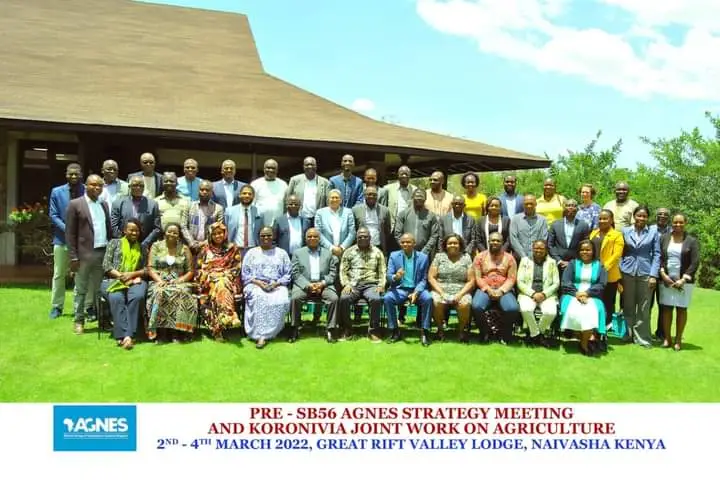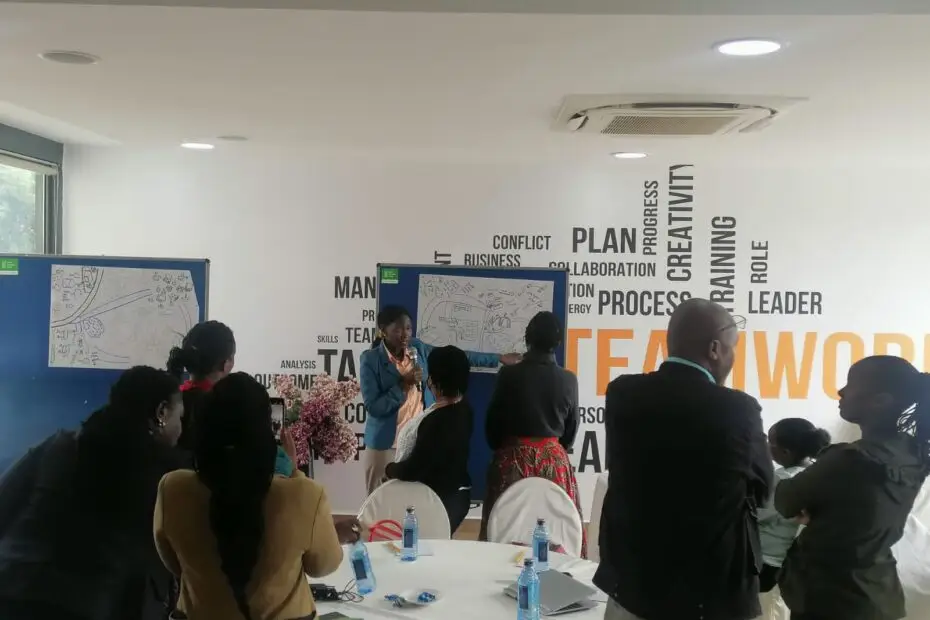Agriculture is critical to Africa’s growth and development, however climate change is destabilising local markets, affecting economic growth and increasing risk on agricultural investments. In Africa, agriculture remains critical for growth and development , however, climate change is destabilising local marketing, inhibiting economic growth and increasing the risk of agriculture investments. In many African countries , economies and livelihoods of citizens depend on agriculture.
Africa Group of Negotiators and Experts (AGNES) Strategy Meeting
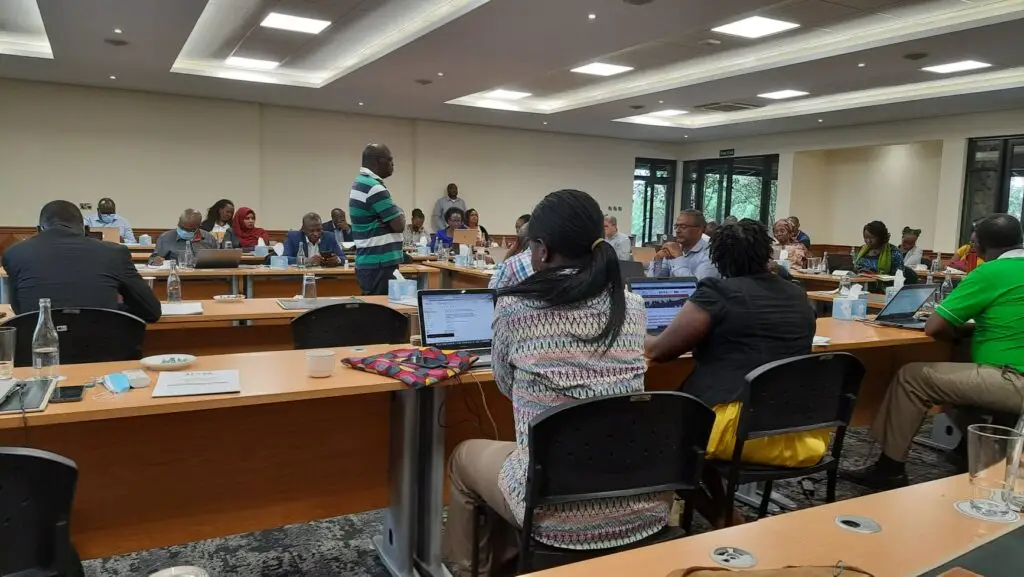
Currently across the continent, weather patterns are changing , there is an increased crop volatility including livestock .Extreme weather events are on the rise and are projects to become even more drastic in future.Climate change is compounding food insecurity on a continent already severely afflicted by hunger and malnutrition. The prevalence of undernourishment is estimated to be 19.1%, or 250.3 million people, across Africa; populations in Asia and Latin America and the Caribbean are undernourished at less than half this rate (8.3% and 7.4 respectively. Africa has become home to the higher number of malnourished people at 433.2 million. According to the FAO,(Food and Agriculture Organization of the UN (FAO), International Fund for Agricultural Development (IFAD), UNICEF, the World Food Programme (WFP), and the World Health Organization) , in 2019, there was an estimated 3 billion people unable to afford the cheapest version of a healthy diet .
The Pre- Subsidiary Body for Scientific and Technological Advice (SBSTA) African Group of Negotiators and Experts Support (AGNES) Strategy Meeting and Koronivia Joint Work on Agriculture ( KJWA) was co-organised by AGNES, Alliance for Food Sovereignty in Africa (AFSA), Climate Research for Africa(CGIAR), Government of Kenya(GOK) –Ministry of Agriculture , International Centre for Tropical Agriculture (CIAT), International Development Research Centre (IDRC),International Livestock Research Institute, Biodiversity International , Accelerating the Impact of CGIAR Research in Africa (AIC Accelerating the Impact of CGIAR Climate Research for Africa (AICCRA), Africa Union Development Agency (AUDA-NEPAD) , Food and Agriculture Organisation(FAO) co-organised a workshop from 2nd -4th March 2022 at the Rift Valley Lodge in Naivasha.
The workshop brought together 40 participants. The participants included CSO representatives, government officials and climate change negotiators. The countries represented during the workshop were: Kenya, Uganda, Tanzania, Lesotho, Rwanda, Burundi Ivory Coast, Eritrea, Ghana, Zambia, Uganda, Togo,Benin,Zimbabwe,Tanzania, South Africa , South Sudan, Senegal, Sudan, Malawi , ,Nigeria ,Gambia, Tunisia and Djibouti.
Cross Section of Participants : Representing Governments , African Group of Negotiators and Civil Society
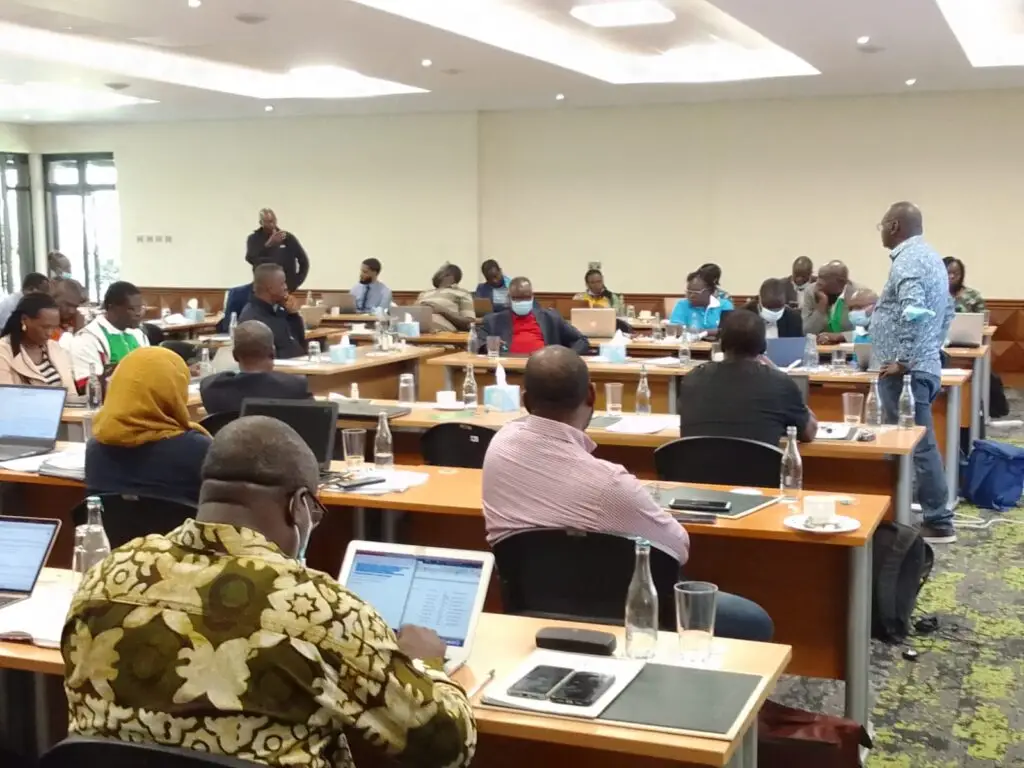
The United Nations Convention on Climate Change (UNFCCC) at the twenty-third Conference of Parties (COP23) held in November in Bonn, Germany, Parties adopted the Koronivia Joint Work on Agriculture (KJWA) that established a joint SBSTA and SBI work on agriculture, thus linking science and implementation.The objective of the Naivasha meeting was to :
-Finalising the two paragraphs on New Zealand(NZ) workshops
-Identify key elements of the report to Conference of Parties (COP)27 on KJWA on issues related to agriculture.
-Agreeing on a draft decision on the future of KJWA on issues related to agriculture under the UNFCCC process for consideration and adoption.
-Consolidate AGN position on how to clean and finalise the two paragraphs on New Zealand workshops.
-Review key highlights on the outcomes of the six KJWA topics to inform the elements of the report to COP27 on issues related to agriculture and
-Prepare a draft decision on the future of KJWA under the UNFCCC process
The forum discussed IPCC report and climate urgency , focusing on devastating impact of climate change on the African continent with emphasis on rising hunger and extreme weather conditions.It was observed that the Final Draft of the IPCC Report recognises the urgency of addressing climate change and mentions agroecology by stating that “ that ecosystem based integrated approaches such as agroecology that increases soil organic matter , enhances soil and water conservation and diversify food production systems.
The convening further deliberated on agroecology as a solution to the current climate crisis affecting Africa and the world at large.Representatives members of AFSA from different countries shared their practices on agroecology and engagement with policy makers .The countries and organisations represented included Kenya ( Haki Nawiri Afrika , Regional Schools and Colleges Permaculture Programme and Indigenous Women and Girls Initiative ), Togo( Young Volunteers for the Environment), Uganda (Participatory Ecological Landu Use Management- PELUM).
Evidence of Agroecology in Climate Resilience -Presentation by BIOVISION
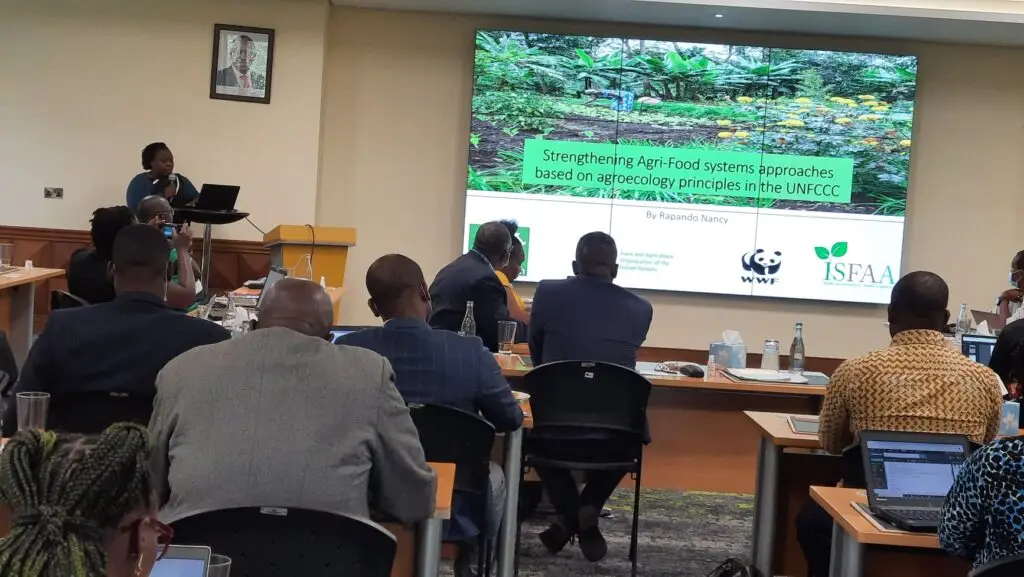
Experiences were shared on agroecology as an entry point to addressing climate change in various countries in Africa .These included:
-Enhancing efficiency and productivity of livestock sub-sectors
-Diversification –drought resistance and breeding
-Water technologies for recycling , irrigation and sustainable management of household agriculture and industrial purpose
-Efforts to diversify adaptive livelihood alternatives that enhance households resilience to climate shocks in a manner that the livelihoods options are friendly and co-exist with the natural ecosystem
-Integrating climate change adaptation and expansion of agroforestry
Other organisations shared their work during the workshop.These included Consortium of Agricultural Research Centres(CGIAR) with a focus on climate security.The presentation entailed pathways climate –conflict linkages and how climate resilience peace works.It was said that climate change is a threat multipliers .It was discussed that policies and programmes fail to tackle the underlying drivers of insecurity .It was mentioned that climate science must be integrated into conflict prevention and peace-building.It was mentioned that there is need to leverage finance towards more integrated progress.It was discussed that it is important to build partnerships across sectors, galvanise expertise and harness innovation.It was stressed that it is important to have accurate and timely data on the funding in relation to addressing climate change.
Climate change was discussed in the context of human security .It was said that climate variability is manifested through variability in temperature and rainfall, increased evaporation , severer and prolonged droughts as well as frequent floods. It was mentioned that climate variability impacts on agricultural and pastoral systems , leads to decline in agricultural output as well, low investment in agriculture, drought induced livestock loss as well as lack of lack of pasture and water for livestock. It was mentioned that environmental degradation results into pressure on resources , perceived scarcity and struggle of resource use. It was said that that negative impacts on agricultural and pastoral systems leads to adverse effects on resource availability and access and at the same time impacts livelihood and food security. It was discussed that livelihoods and food insecurity lead to poverty and marginalisation, youth unemployment and social inequality including among gender and regional inequalities.
Forced mobility and presence of refugee community was cited to be as a result of pressure on resources , perceived scarcity and struggle over resources .It was discussed that climate induced mobility leads to seasonal livestock mobility in dry periods .It was further said that proximity and interaction between refugees and host community often results into tensions over shared resources and risk of sexual and gender based violence.It was said that there is need for an understanding of complexities of climate and security for informed decision making. It was discussed that t is important to programme for peace that is developing peace sensitive operations for millions of beneficiaries. It was discussed that articulating the role of food systems in a climate crisis for policies and frameworks is key and that leveraging finance by aligning objectives and incentives align the humanitarian development and peace nexus. Key elements discussed were as follows:
-Climate security gender nexus
-Climate security mitigation nexus
-Climate security inequality nexus
-Climate security measurement indicators
-Climate security migration nexus
-Climate security policy coherence
On policy and technical potential for agroecology in Africa, It was discussed that there are policy and technical potential and case studies were shared Kenya and Senegal. For the policy potential, it was said that translation of interdisciplinary and systemic nature of agroecology into policies remains challenging .It was discussed that results highlighting the importance of training and awareness raising activities as well knowledge to creation and its dissemination.For example , the potential of agroecology for Kenya and Senegal was stated as:
-Farmers practicing agroecology farmers have significantly higher resilience than non-practicing farmers farmers
-Agroecological systems have a higher capacity to absorb , cope with and adapt to climate change
-Agroecology enhances both human and natural capital of the farmer
-Spatial and temporal heterogeneity as well as sharing of traditional knowledge are aspects of strengthening resilience
It was stated that the latest piece of evidence from Ethiopia , push –pull study is an extremely good illustration of what agroecology is at practice level that is building synergies between plants and animals , building up healthy soil , replacing fertilisers and pesticides and replacing it by ecosystem services.
Agroecology for Climate Justice Dialogue-Machakos
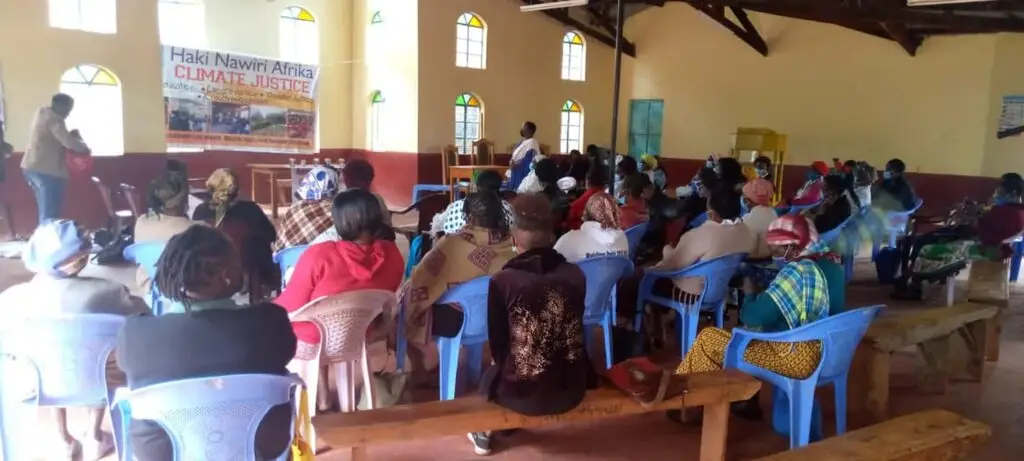
It was stated that a campaign on Agroecology was launched by AFSA members in 2019 and this is being carried out in 14 African countries.During the workshop , on the ground experiences on agroecology were shared from Kenya, Uganda and Togo.From Togo, it was said that policy makers and community members were mobilised in support of agroecology.It was stated that the key strategies utilised were stakeholder mobilisation , information sharing , creation of platforms for exchanges using the Negotiated Approach.It was said that in Togo , the government has shown the political will in support of agroecology.
Transition from Conventional Production to Agroecology
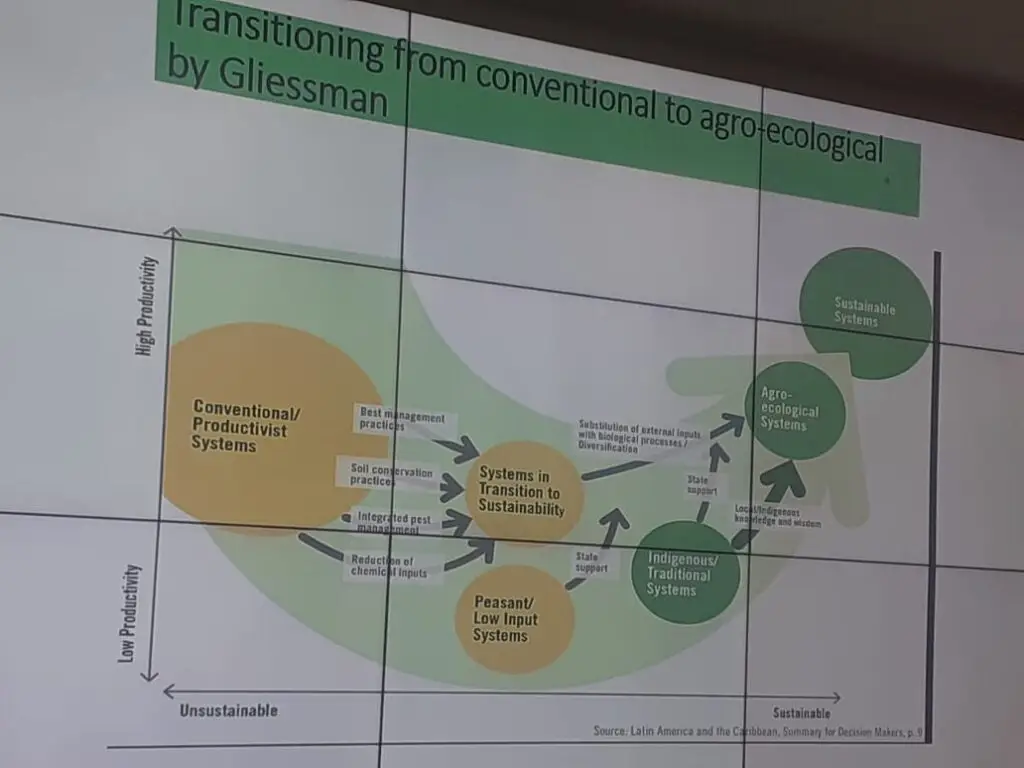
From Kenya , experiences of implementing an Agroecology for Climate Action Campaign was shared .The project is collaboratively implemented by https://hakinawiriafrika.org/, Regional Schools and Colleges Permaculture Programme and Indigenous Women and Girls Initiative.It was stated that activities undertaken during implementation of the campaign include community dialogues on climate change and agroecology, stakeholder mobilization , engagement of policy makers, media engagement and development of a policy brief. It was said that the community dialogues had been carried out in Machakos, Kiambu, Laikipia , Kajiado and Nairobi.It was explained that the objective of the campaign is to lobby for agroecology to be part of Kenya’s National Adaptation Plans (NAPs).It was discussed that an assessment of County policies was done to identify gaps in these policies .It was stated that a policy brief has been developed linking gaps and identification of opportunities on agroecology can address climate change in various counties in Kenya.
Agroecology for Climate Action Community Dialogues
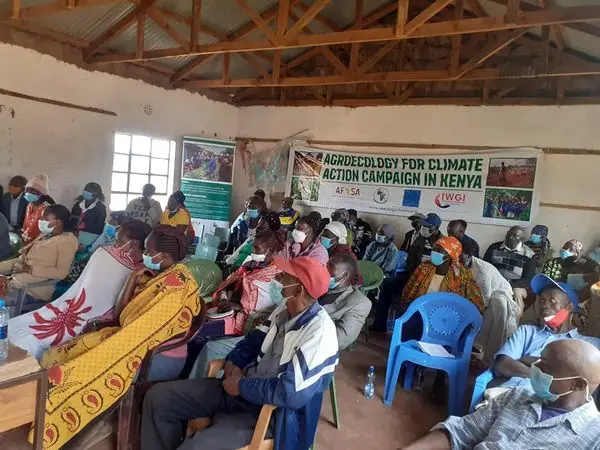
Participatory Land Use Management (PELUM)-Uganda PELUM shared their experiences how they engage local communities and government on issues of agroecology. It was explained that a stakeholders meeting had been held which also involved showcasing community actions such as indigenous seeds and other ecologically grown food. It was stated that government officials present in these forums were in support of agroecology and that moving forward , more dialogues would be held with communities for popular support.
It was stated that what causes the challenge towards adoption of agroecology is a set of lock-ins.These were highlighted as the tight relationship between industry and governments t the expense of smallholder farmers.These lock-ins were said to be characterised by:Export orientation, concentration of power, expectation of cheap food, dependency, measures of success , short term thinking,feed the world narratives and short term thinking.
Million Belay -General Coordinator of the Alliance for Food Sovereignty in Africa sharing about Lock ins and how they Impact on Agroecology
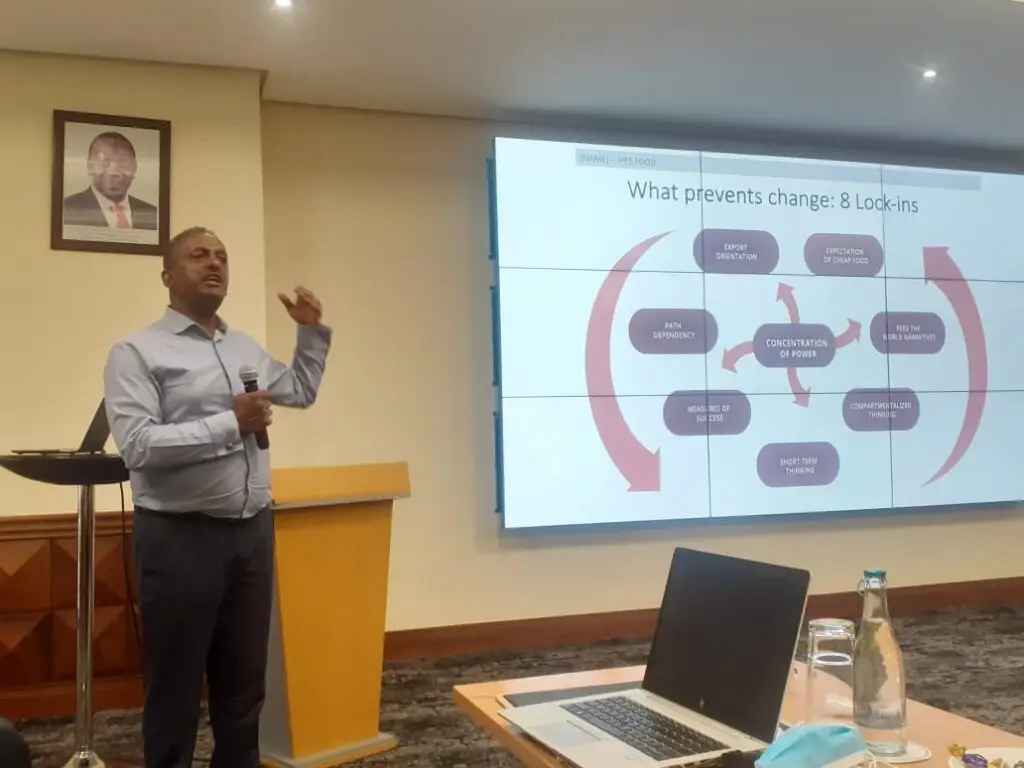
An interrogation was made as to how policies could be used to address climate related challenges .This , it was questioned could be through producing more food, production of more food which is nutritious and healthy, producing more food with is nutritious and healthy and without affecting the biosphere including the climate.
Policy and Climate Crisis
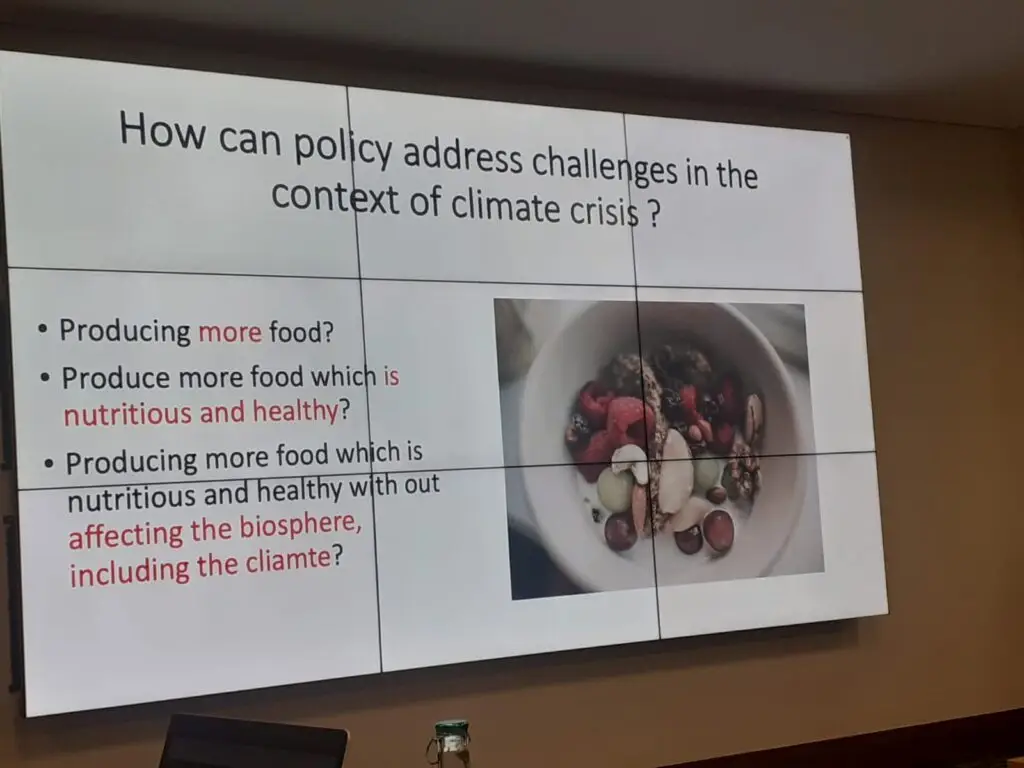
The narratives for Green Revolution in Africa were describes as priority to businesses to produce more and feed Africa,farmers seed being labelled part of the problem and should be replaced with patented hybrids,the problem of calorie , thus more calories being proposed as a solution, land should be given to those who can make it more productive, reorienting agriculture to the market , knowledge comes from science and that it is possible to produce one fits all solution.
Assessment of AGRA Progress Goals in Africa
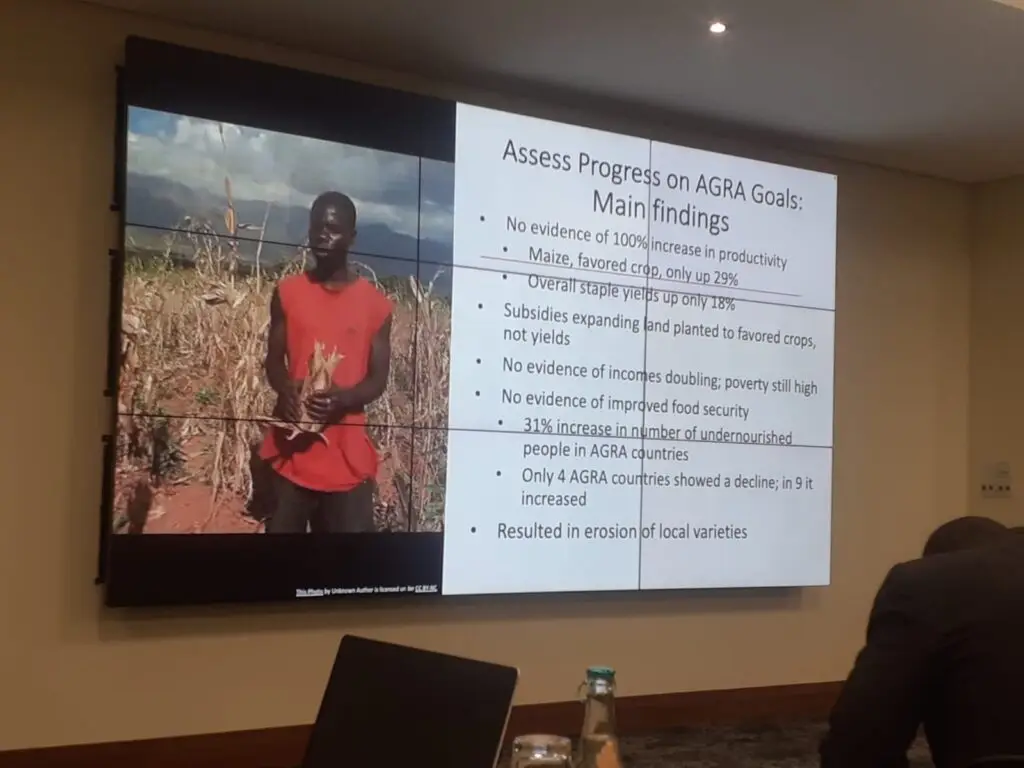
The forum discussed the 10 elements of agroecology according to FAO ,which was described as a myriad of interactions and interdependences which included recycling, synergies , co-creation and sharing of knowledge diversity , human and social values and responsible governance.An assessment of the progress of AGRA’s goals was sharing with main findings which included:
-No evidence of 100% increase in productivity
-Maize is the favoured crop , overall staple yields up to only 18%
-Subsidies expanded and planted to favoured crops not yields
-No evidence of incomes doubling , poverty levels is high
-Resulted in erosion of local varieties
On the way forward, in relation to the Koronivia Joint Work on Agriculture, it was stated that there was an acknowledgement of the issues relating to agriculture, the existing gaps on the work of constituted bodies in relation to agriculture in the UNFCC process so as to enhance action in agriculture through domestic actions and international cooperation. There was a welcoming of new topics and a highlighting of the potential of creating interlinkages that lead to enhanced action and improvements in implementation. It was stated that there is enhanced consideration and imp, mentation of issues related to agriculture and that there is a fundamental priority of safeguarding food security and ending hunger and the particular vulnerabilities of food production systems to the adverse impacts of climate change. It was said that there is a recognition that the impact of COVID-19 pandemic has exposed the limited resilience of the global food systems and limited the achievements of Sustainable Development Goals including the efforts towards self-food sufficiency. It was said that the convening welcomed the IPCC Working Group I and II continuation to the 6th Assessment Report which highlights the vulnerability of the agricultural systems to adverse impacts of climate change. It was acknowledged that there is increasing weather and climate extreme events have exposed millions of people to acute food and water insecurity, especially small-scale food producers, low income households and Indigenous Peoples in developing countries. It was acknowledged that there is need to strengthen and enhance the existing institutional arrangements to enable consolidate and advance work on issues related to agriculture. The urgency of scaling up action and support including finance, capacity building and technology development and transfer was emphasised, to enhance adaptive capacity, strengthen resilience and reduce vulnerability to climate change of farmers and other vulnerable groups, particularly women and youth. A proposal for decision to establish the Koronivia (Standing)Committee on Agriculture to enhance action in agriculture through domestic actions and international cooperation. It was stated that all constituted bodies under the Convention and operating entities of the Financial Mechanisms to consider how to integrate and strengthen issues related to agriculture in their existing mandates and work plans and to report regularly to the Conference of Parties on these activities and at the same time identify progress and further work to be undertaken , commencing a the twenty eighth session(COP28).Parties and observer organisations were invited to submit their views on the Committee ( idea) and this was to be done by March 2023.The United Nations and other relevant institutions , agencies and entities , research community , CSOs and farmer organisations, and the private sector were called upon to strengthen cooperation and collaboration , including through partnerships with the Committee for enhanced action in the agriculture sector.
Group Photo
